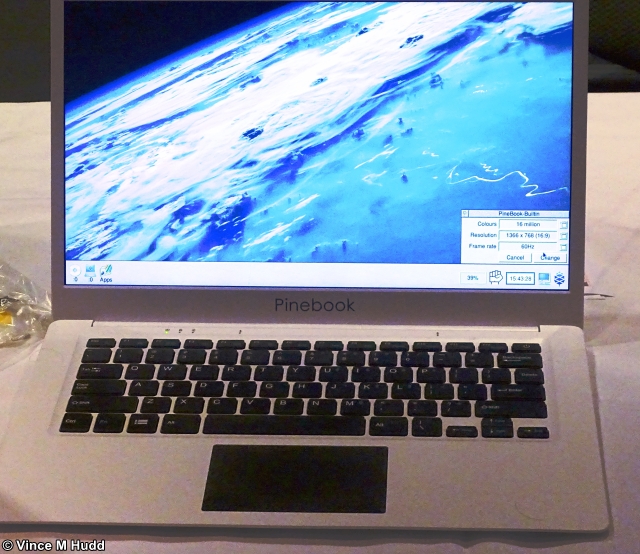R-Comp’s ARM-based RISC OS laptop lands, allowing its users to take off (or catch a train, whatever)
First hinted at by R-Comp‘s Andrew Rawnsley in the run up to last year’s London Show, and then shown off at the event itself, the ARMbook (aka ARMbok due to a typo in an early newsletter) is an ARM-based laptop that runs RISC OS natively1, rather than under emulation on top of another operating system.
The story behind the laptop began with RISC OS Developments‘ acquisition of Castle, and with it the rights to RISC OS itself and the subsequent adoption of the Apache open source licence. This led to an approach from PINE64 to port RISC OS to their laptop, the Pinebook. An early version of that work was shown off at last year’s London Show, with R-Comp allowing people to register their interest and put down a deposit to secure their place in the queue for one of the new machines – with machines being shipped to those early adopters since around the time of the Wakefield Show earlier this year.
And now, barely a week before the 2019 London Show, the laptop is now available to order from the company, with that show marking its ‘official’ formal release.

The laptop features an Allwinner A64 SOC at its heart (which is based on the quad-core ARM Cortex A53 processor, running at approximately 1.2Ghz – though, as always, remember that RISC OS currently only uses a single core), and includes 2GB of on-board RAM and two external USB sockets. The screen is a high quality IPS one that runs at 1920×1080, and the whole device – including a battery that, thanks to the low power nature of ARM coupled with the low-power usage of RISC OS itself, offers an impressive life between charges of up to 14 hours – weighs in at around the same as a bag of sugar, at 1Kg, and measures just 1cm thick.
The system is able to boot into either RISC OS or Linux, which means that you have an alternative operating system easily available for those occasions when RISC OS doesn’t meet your requirements, with RISC OS and the accompanying software supplied on a card with size options ranging from 32GB up to 256GB.
That software package includes the usual goodies found on the standard RISC OS disc image, along with the usual raft of software R-Comp bundles with all their machines – but for the ARMbook also includes a number of laptop management tools covering keyboard configuration, screen brightness, battery management, and security.
The hardware itself supports wireless networking but, since RISC OS doesn’t yet have any support for WiFi, R-Comp bundles a wired network adaptor, allowing you to plug in to your usual wired networks – and if you want to go wireless, the solution would be a suitable wireless bridge, noting that you’d need to use Linux to configure it, or R-Comp’s own PiFi solution, which uses a Raspberry Pi as a bridge.
And the price tag for this slender beauty? £439.00 including VAT. Full details can be found on R-Comp’s ARMini website.
!ReadMe
- A point of pedantry: In an email announcing the availability of the laptop, R-Comp described it as ‘the first “native” ARM-powered laptop since Acorn’s A4 in the early 90s – 25+ years ago!’ This is in fact not true. In the very next sentence, it is made clear that they are differentiating a properly designed laptop from hacked solutions whereby a laptop ‘case’ is put around a board by a third party (such as the Pi-Top) and from laptops that run RISC OS under emulation (such as some of the other systems they sell) – all of which is fair enough. However, a key point is that they don’t actually clarify running RISC OS in their claim. It’s billed as ‘the first “native” ARM-powered laptop since Acorn’s A4’ rather than ‘the first “native” ARM-powered laptop to run RISC OS since Acorn’s A4′. This is worth noting, because there have been other ARM-powered laptops in that intervening period.



